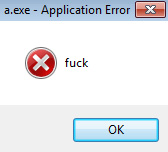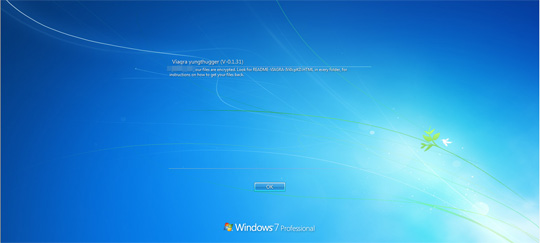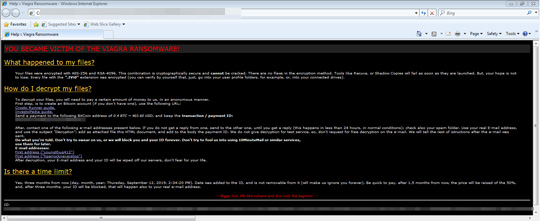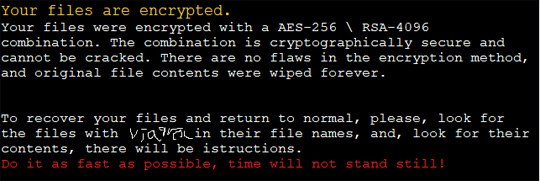Ransom.MSIL.VIGRA.THIODAIA
RDN/Ransom (McAfee); HEUR:Trojan.MSIL.DelShad.gen (Kaspersky)
Windows


Threat Type: Ransomware
Destructiveness: No
Encrypted: No
In the wild: Yes
OVERVIEW
This Ransomware arrives on a system as a file dropped by other malware or as a file downloaded unknowingly by users when visiting malicious sites.
It encrypts files found in specific folders. It drops files as ransom note.
TECHNICAL DETAILS
Arrival Details
This Ransomware arrives on a system as a file dropped by other malware or as a file downloaded unknowingly by users when visiting malicious sites.
Installation
This Ransomware adds the following processes:
- vssadmin Delete Shadows /All /Quiet → deletes shadow copies
- cipher /W:%System Root%:\ → wipes data from %System Root%
- fsutil usn deletejournal /D %System Root% → delete an active USN change journal on %System Root%
- shutdown -L → logs off the current user on machine
(Note: %System Root% is the Windows root folder, where it usually is C:\ on all Windows operating system versions.)
Other System Modifications
This Ransomware modifies the following registry entries:
HKEY_CURRENT_USER\Control Panel\Desktop
Wallpaper = %Desktop%\BACKGROUND.BMP
HKEY_CURRENT_USER\Control Panel\Desktop
WallpaperStyle = 2
HKEY_LOCAL_MACHINE\SOFTWARE\Microsoft\
Windows\CurrentVersion\Policies\
System
legalnoticecaption = Viagra yungthugger (V-0.1.31)
HKEY_LOCAL_MACHINE\SOFTWARE\Microsoft\
Windows\CurrentVersion\Policies\
System
legalnoticetext = {user name}, your files are encrypted. Look for README-VIAGRA-{8 random characters}.HTML in every folder, for instructions on how to get your files back.
HKEY_LOCAL_MACHINE\SOFTWARE\Microsoft\
Windows NT\CurrentVersion
RegisteredOwner = {user name}, your files are encrypted. Look for README-VIAGRA-{8 random characters}.HTML in every folder, for instructions on how to get your files back.
It sets the system's desktop wallpaper to the following image:
Dropping Routine
This Ransomware drops the following files:
- %Desktop%\BACKGROUND.BMP → used as wallpaper
(Note: %Desktop% is the current user's desktop, which is usually C:\Documents and Settings\{User Name}\Desktop on Windows 2000(32-bit), XP, and Server 2003(32-bit), or C:\Users\{user name}\Desktop on Windows Vista, 7, 8, 8.1, 2008(64-bit), 2012(64-bit) and 10(64-bit).)
Other Details
This Ransomware encrypts files with the following extensions:
- .txt
- .doc
- .jpg
- .ogg
- .jpeg
- .tif
- .tiff
- .png
- .docx
- .docm
- .xlsm
- .xlsx
- .pptm
- .pptx
- .ppt
- .xls
- .xla
- .dot
- .dotm
- .odb
- .odf
- .bmp
- .odg
- .htm
- .html
- .xml
- .pfx
- .bit
- .com
- .css
- .js
- .vbs
- .sln
- .au3
- .flac
- .url
- .ini
- .cfg
- .conf
- .avi
- .mp3
- .m4a
- .3gp
- .vid
- .vob
- .asm
- .webmoney
- .sav
- .nth
- .java
- .jar
- .sis
- .key
- .$$$
- .reg
- .apk
- .ncf
- .navpath
- .nfo
- .nokogiri
- .nrg
- .nsh
- .rtf
- .nvram
- .oa2
- .oa3
- .obj
- .obt
- .obx
- .obz
- .ocr
- .odif
- .odo
- .oda
- .odl
- .osd
- .osf
- .ps1
- .p01
- .p10
- .p12
- .7z
- .rar
- .zip
- .arj
- .tar.gz
- .tar
- .pak
- .pcd
- .pdb
- .pdc
- .prc
- .peb
- .pef
- .cad
- .pkg
- .ply
- .ppx
- .proofingtool
- .ps
- .pub
- .pubx
- .py
- .pyc
- .pys
- .qbx
- .r00
- .rw
- .rwlibrary
- .so
- .sam
- .sh
- .shtml
- .xhtml
- .smh
- .opus
- .sql
- .sqlite1
- .sqlite
- .spb
- .ssh
- .struct
- .suf
- .ssx
- .tex
- .tdr
- .jtd
- .tga
- .torrent
- .tor
- .tml
- .lua
- .tgz
- .thm
- .web
- .wdb
- .gif
- .gadget
- .erf
- .wmv
- .mov
- .cdr
- .qbm
- .x11
- .war
- .eps
- .bik
- .jtt
- .go
- .602
- .c
- .cs
- .h
- .cpp
- .hpp
- .sln
- .rdb
- .cer
- .mp2
- .xhtml
- .php
- .mf
- .xsl
- .sheet
- .sas7bdat
- .djvu
- .stone
- .tga
- .eml
- .mmpz
- .mmp
- .bin
- .3g2
- .sql
- .3dm
- .wks
- .wps
- .mpa
- .wpl
- .deb
- .elf
- .dbg
- .sav
- .csv
- .cgi
- .bat
- .wsf
- .svg
- .ico
- .cfm
- .rss
- .class
- .sh
- .swift
- .mkv
- .sb
- .pk3
- .skb
- .szs
- .prz
- .mpp
- .spc
- .myd
- .ccp4
- .eossa
- .cdf
- .ps1
- .ps1xml
- .p7b
- .p7c
- .gsm
- .vgm
- .bkp
- .band
- .hs
- .gml
- .e
- .d
- .xpl
- .osr
- .osu
- .mcpack
- .mctemplate
- .lip
- .3ds
- .wad
- .gba
- .gbc
- .fds
- .maf
- .jsp
- .ihtml
- .cps
- .vb
It does the following:
- It deletes the original files after encryption.
- It modifies the volume label of encrypted drives to EnCiPhErEd-{8 random characters}.
- It displays the following window upon execution:

- It creates the following Windows pre-login message:

Ransomware Routine
This Ransomware encrypts files found in the following folders:
- %System Root%\Users
- %System Root%\Documents and Settings
- %System Root%\xampp
(Note: %System Root% is the Windows root folder, where it usually is C:\ on all Windows operating system versions.)
It appends the following extension to the file name of the encrypted files:
- .{base-64 encoded string}{4 random characters}
It drops the following file(s) as ransom note:
- {Encrypted Directory}\README-VIAGRA-{8 random characters}.HTM

SOLUTION
Step 1
Trend Micro products with the XGen technology detect this malware as
- Troj.Win32.TRX.XXPE50FFF031
Step 2
Before doing any scans, Windows 7, Windows 8, Windows 8.1, and Windows 10 users must disable System Restore to allow full scanning of their computers.
Step 3
Note that not all files, folders, and registry keys and entries are installed on your computer during this malware's/spyware's/grayware's execution. This may be due to incomplete installation or other operating system conditions. If you do not find the same files/folders/registry information, please proceed to the next step.
Step 4
Restore these modified registry values
Important:Editing the Windows Registry incorrectly can lead to irreversible system malfunction. Please do this only if you know how to or you can seek your system administrator's help. You may also check out this Microsoft article first before modifying your computer's registry.
- In HKEY_CURRENT_USER\Control Panel\Desktop
- Wallpaper = %Desktop%\BACKGROUND.BMP
- Wallpaper = %Desktop%\BACKGROUND.BMP
- In HKEY_CURRENT_USER\Control Panel\Desktop
- WallpaperStyle = 2
- WallpaperStyle = 2
- In HKEY_LOCAL_MACHINE\SOFTWARE\Microsoft\Windows\CurrentVersion\Policies\System
- legalnoticecaption = Viagra yungthugger (V-0.1.31)
- legalnoticecaption = Viagra yungthugger (V-0.1.31)
- In HKEY_LOCAL_MACHINE\SOFTWARE\Microsoft\Windows\CurrentVersion\Policies\System
- legalnoticetext = {user name}, your files are encrypted. Look for README-VIAGRA-{8 random characters}.HTML in every folder, for instructions on how to get your files back.
- legalnoticetext = {user name}, your files are encrypted. Look for README-VIAGRA-{8 random characters}.HTML in every folder, for instructions on how to get your files back.
- In HKEY_LOCAL_MACHINE\SOFTWARE\Microsoft\Windows NT\CurrentVersion
- RegisteredOwner = {user name}, your files are encrypted. Look for README-VIAGRA-{8 random characters}.HTML in every folder, for instructions on how to get your files back.
- RegisteredOwner = {user name}, your files are encrypted. Look for README-VIAGRA-{8 random characters}.HTML in every folder, for instructions on how to get your files back.
Step 5
Search and delete these files
- %Desktop%\BACKGROUND.BMP
- {Encrypted Directory}\README-VIAGRA-{8 random characters}.HTM
Step 6
Scan your computer with your Trend Micro product to delete files detected as Ransom.MSIL.VIGRA.THIODAIA. If the detected files have already been cleaned, deleted, or quarantined by your Trend Micro product, no further step is required. You may opt to simply delete the quarantined files. Please check the following Trend Micro Support pages for more information:
Step 7
Restore encrypted files from backup.
Step 8
Reset your Desktop properties
NOTES:
- Enabling Volume Shadow Service
- Run the command prompt (cmd.exe) as administrator.
- Enable volume shadow service using the following command:
net start
Did this description help? Tell us how we did.



